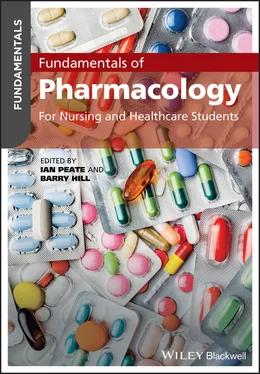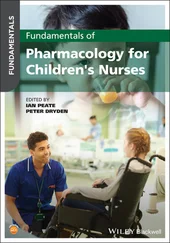A shared decision‐making approach to care has been shown to benefit patients in terms of their active engagement in the treatment plan or taking the prescribed medications (Edwards and Elwyn, 2009). As such, it is an ethical approach to care which has also been shown to reduce the incidences of medico‐legal claims where there is a negative outcome (Studdert et al., 2005). As health professionals, we should always aim to fully involve patients in decisions about drug treatments to maximise engagement and increase the potential for success.
Health professionals also abide by the principle of justice , which is the belief that people should be treated fairly, equally and reasonably. At its heart, justice is about equality; but how equality is determined can be ambiguous and problematic in healthcare. An example of the difficulties posed within this principle is often seen in relation to the fair and equal distribution of resources: ‘distributive justice’. A drug for a specific condition may be available within one healthcare trust but the same drug is not available to patients with the same or similar condition in another trust. Sometimes colloquially labelled the ‘postcode lottery’, this occurs as a result of differing priorities for resources among those who make difficult commissioning decisions about resources on a local level.
Health professionals should also be honest and tell the truth to enable someone to have the full information relevant to them in order to make full rational choices about their care. This is known as veracity and involves conveying accurate and objective information to the patient. Giving patients full information regarding treatment options is the most common application of the veracity principle. Disclosures of medication errors are also an obvious example of veracity, and the recent introduction of the ‘Duty of Candour’ guidance for health professionals (NMC and GMC, 2015) highlights the importance of the veracity principle. Informing patients when something has gone wrong, apologising, and offering a remedy are measures that are advised by Sir Robert Francis in his report on the failings of the Mid‐Staffordshire Health Trust (2013). Francis (2013) stated that candour and transparency are key components of a safe and effective culture for patient care. However, in reality, true veracity is a complex notion. Returning to the example of the drug that is available in one health trust and not another, health professionals engage in such rationing ‘inconspicuously’ (Williamson, 2010, p. 201) without necessarily informing patients that they are being denied something that could benefit them. Aside from the greater ethical issues concerned with who makes the decisions and how they are implemented, there is the more immediate concern relating to veracity and the decision on whether to inform patients.
Finally, the principle of fidelity requires the act of loyalty and trustworthiness; it involves keeping our promises, performing our duties and doing what is expected of us within our relationships with patients. This principle can be conflicted where the health professional's loyalty or obligation may be torn between their patients and colleagues or the organisation for which they work. Conflict may also arise as a result of the patient lacking capacity to make an informed choice and the health professional being compelled to override the wishes of their patient in their best interests.
Clinical considerations: Consent to treatment (adults)
Adults with capacity: The authority to treat comes solely from the patient. According to UK law, consent by proxy is not permitted for the care or treatment of adults who have the capacity to make an informed decision.
Adults lacking capacity: Where a patient does not have the mental capacity to make an informed decision regarding their care due to an impairment or disturbance to the functioning of the mind – e.g. acute confusional state, dementia, brain injury, being unconscious – then under the Mental Capacity Act (MCA, 2005) the health professional can decide upon the treatment that is deemed in the best interests of the patient without the consent of the next of kin.
Section 3(1) of the MCA (2005) sets out the following benchmarks by which to assess an adult's capacity:
1 If they are unable to understand the information given to them relating to the decision.
2 They are unable to retain the information.
3 They are unable to weigh the information as part of the decision‐making process.
4 They are unable to communicate their decision.
When ethical dilemmas in practice are met, consideration needs to be given to which principles are in conflict to then consider which is more important. In helping to resolve ethical dilemmas, ethical theories are called upon. Several exist, including:
utilitarian/consequentialism
deontological ethics
virtue ethics
nursing ethics.
Utilitarian or consequentialism theory considers the rightness of an act as that which, when considering the costs and benefits, creates the greatest good for the greatest number. For example, the issue of immunisation is currently a controversial one with a minority of parents deciding to opt out of immunisation programs for their children. This puts children and other vulnerable members of society at risk of developing some diseases that were previously eradicated in the UK, e.g. measles (Public Health England, 2019), with the associated implications to the individuals, wider society and to the health service. The utilitarian perspective would be that all eligible children should be immunised irrespective of the views/wishes of their parents. Utilitarianism would not be concerned with the autonomy of the individual (the right to not give consent to the vaccine) as this is arguably in conflict with the greater good.
Clinical considerations: Consent to treatment – children
Sixteen to seventeen‐year‐olds with capacity: According to Section 8(1) of the Family Law Reform Act (1969), consent can be sought from the child for medical and dental treatment. However, those with parental responsibility may still consent on the child's behalf.
Sixteen to seventeen‐year‐olds lacking capacity: Anyone with parental responsibility can consent on behalf of a child who lacks capacity. In situations where those with parental responsibility do not consent to treatment, but where treatment is felt to be in the best interests of the child, a court order may be obtained. In an emergency situation, treatment may still be provided without parental consent where it is deemed a necessity (Glass v UK, 2004).
Under sixteen years of age: An assessment of the child relating to ‘Gillick’ competence (Gillick v West Norfolk and Wisbech Area Health Authority, 1985) would determine whether the child has sufficient maturity and understanding of what is involved to enable them to make a decision to consent to treatment or not.
Deontological ethics, or deontology, is an approach to ethics that determines goodness or rightness from examining acts rather than the consequences of the act as in utilitarianism. Deontologists look at rules and duties. For example, the act may be considered the right thing to do even if it produces a bad consequence, if it follows the rule that ‘one should do unto others as they would have done unto them’. According to deontology, we have a duty to act in a way that does those things that are inherently good as acts. In this approach, the duty of care to the individual takes priority over any other considerations. Going back to our example of immunisations, children are, in reality, not forced to have immunisations where parents have opted out. Health professionals have a duty to ensure that any care given is consented to (within the parameters of the MCA 2005 as outlined above). Without this consent we cannot inject a live vaccine into a child no matter what the potential implications might be for wider society. So the act itself is good (abiding by rules of consent), but the consequence may be a negative one (the child contracting measles and passing this on to others). For deontologists, the ends or consequences of our actions are not important, nor are our intentions. Duty is the key consideration. However, it is not always clear what one's duty is. While we may agree that our duty is to ‘do no harm’, there will be instances where health professionals will have to override this with their duty of care.
Читать дальше












